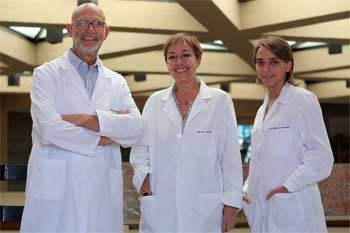Los lodos de depuradora en cultivos de legumbres pueden ayudar a mantener la riqueza biológica del suelo
Sewage sludge in legume crops can help maintain soil biological richness
Experts from department of Plant Biology of the University of Navarra have studied its application in alfalfa plants.

Mª Carmen Antolín, Mª Laura Fiasconaro and Manuel Sánchez-Díaz, researchers at department of Plant Biology of the University of Navarra, have confirmed that the use of sewage sludge in the cultivation of legumes - specifically in alfalfa plants - could help to maintain the biological richness of the soil.
The work, carried out at partnership with business NILSA and published in the scientific journal Journal of Hazardous Materials, has shown that although the presence of the sludge did not affect the alfalfa's ability to form nodules - the Structures that allow them to absorb nitrogen from the atmosphere - their metabolic activity did decrease. Despite this, the alfalfa plants grew optimally, as they were able to assimilate both the nitrogen in the sludge and the nitrogen in the air.
According to one of its authors, Professor Mª Carmen Antolín, "the excessive use of fertilizers in agricultural soils alters soil microbial activity and prevents associations between plants and bacteria, a beneficial and necessary relationship. In the case of legumes - such as peas, beans, soybeans or alfalfa - they can obtain nitrogen from the air by establishing symbiosis with certain soil bacteria. That association gives rise to Structures in the roots called nodules." "Therefore," the expert continues, "legumes do not depend on fertilizers that may be added, as is the case with other crops."
For this reason, the specialists at School de Ciencias set out to study the effect of a particular fertilizer subject , such as sludge, on plants that apparently do not need it. "We then corroborated that their presence does not cause damage to these plants and instead enriches the environmental quality of the soil," stresses Dr. Antolin.
The benefits of sewage sludge
In the opinion of the researcher from the University of Navarra, the employment of sewage sludge in agriculture is very positive for the soil, since they are compounds rich in organic subject and nutrients such as nitrogen, they improve soil structure and their use as fertilizers represents a significant energy saving.
The study, which was carried out in the greenhouses of the academic center, is part of the doctoral thesis of Mª Laura Fiasconaro, who is carrying out this work thanks to the scholarship granted by the association of Friends of the University of Navarra.
